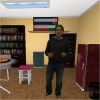Interreality for the management and training of psychological stress: study protocol for a randomized controlled trial
- PMID: 23806013
- PMCID: PMC3699393
- DOI: 10.1186/1745-6215-14-191
Interreality for the management and training of psychological stress: study protocol for a randomized controlled trial
Abstract
Background: Psychological stress occurs when an individual perceives that environmental demands tax or exceed his or her adaptive capacity. Its association with severe health and emotional diseases, points out the necessity to find new efficient strategies to treat it. Moreover, psychological stress is a very personal problem and requires training focused on the specific needs of individuals. To overcome the above limitations, the INTERSTRESS project suggests the adoption of a new paradigm for e-health--Interreality--that integrates contextualized assessment and treatment within a hybrid environment, bridging the physical and the virtual worlds. According to this premise, the aim of this study is to investigate the advantages of using advanced technologies, in combination with cognitive behavioral therapy (CBT), based on a protocol for reducing psychological stress.
Methods/design: The study is designed as a randomized controlled trial. It includes three groups of approximately 50 subjects each who suffer from psychological stress: (1) the experimental group, (2) the control group, (3) the waiting list group. Participants included in the experimental group will receive a treatment based on cognitive behavioral techniques combined with virtual reality, biofeedback and mobile phone, while the control group will receive traditional stress management CBT-based training, without the use of new technologies. The wait-list group will be reassessed and compared with the two other groups five weeks after the initial evaluation. After the reassessment, the wait-list patients will randomly receive one of the two other treatments. Psychometric and physiological outcomes will serve as quantitative dependent variables, while subjective reports of participants will be used as the qualitative dependent variable.
Discussion: What we would like to show with the present trial is that bridging virtual experiences, used to learn coping skills and emotional regulation, with real experiences using advanced technologies (virtual reality, advanced sensors and smartphones) is a feasible way to address actual limitations of existing protocols for psychological stress.
Trial registration: http://clinicaltrials.gov/ct2/show/NCT01683617.
Figures






Similar articles
-
Experiential virtual scenarios with real-time monitoring (interreality) for the management of psychological stress: a block randomized controlled trial.J Med Internet Res. 2014 Jul 8;16(7):e167. doi: 10.2196/jmir.3235. J Med Internet Res. 2014. PMID: 25004803 Free PMC article. Clinical Trial.
-
Interreality in the management of psychological stress: a clinical scenario.Stud Health Technol Inform. 2010;154:20-5. Stud Health Technol Inform. 2010. PMID: 20543263
-
Inter-reality in the evaluation and treatment of psychological stress disorders: the INTERSTRESS project.Stud Health Technol Inform. 2012;181:8-11. Stud Health Technol Inform. 2012. PMID: 22954818
-
Ubiquitous health in practice: the interreality paradigm.Stud Health Technol Inform. 2011;163:185-91. Stud Health Technol Inform. 2011. PMID: 21335786
-
Interreality in practice: bridging virtual and real worlds in the treatment of posttraumatic stress disorders.Cyberpsychol Behav Soc Netw. 2010 Feb;13(1):55-65. doi: 10.1089/cyber.2009.0320. Cyberpsychol Behav Soc Netw. 2010. PMID: 20528294 Review.
Cited by
-
Immersive Virtual Reality for the Reduction of State Anxiety in Clinical Interview Exams: Prospective Cohort Study.JMIR Serious Games. 2020 Jul 9;8(3):e18313. doi: 10.2196/18313. JMIR Serious Games. 2020. PMID: 32673223 Free PMC article.
-
Effects of affective content and motivational context on neural gain functions during naturalistic scene perception.Eur J Neurosci. 2021 May;53(10):3323-3340. doi: 10.1111/ejn.15194. Epub 2021 Apr 5. Eur J Neurosci. 2021. PMID: 33742482 Free PMC article.
-
Experiential virtual scenarios with real-time monitoring (interreality) for the management of psychological stress: a block randomized controlled trial.J Med Internet Res. 2014 Jul 8;16(7):e167. doi: 10.2196/jmir.3235. J Med Internet Res. 2014. PMID: 25004803 Free PMC article. Clinical Trial.
-
Telemonitoring with respect to mood disorders and information and communication technologies: overview and presentation of the PSYCHE project.Biomed Res Int. 2014;2014:104658. doi: 10.1155/2014/104658. Epub 2014 Jun 24. Biomed Res Int. 2014. PMID: 25050321 Free PMC article. Review.
-
Augmented Reality: A Brand New Challenge for the Assessment and Treatment of Psychological Disorders.Comput Math Methods Med. 2015;2015:862942. doi: 10.1155/2015/862942. Epub 2015 Aug 3. Comput Math Methods Med. 2015. PMID: 26339283 Free PMC article. Review.
References
Publication types
MeSH terms
Associated data
LinkOut - more resources
Full Text Sources
Other Literature Sources
Medical

